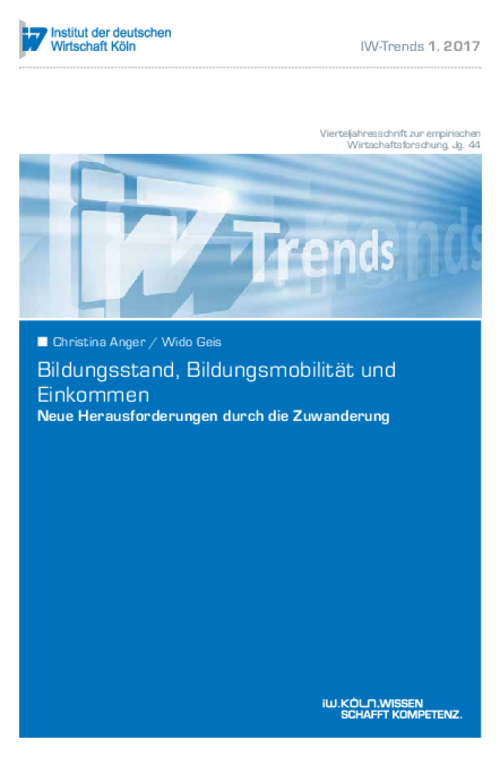The income prospects of young people in Germany depend to a large extent on their level of education. 31.5 per cent of those without a vocational qualification are in the lowest quintile of income distribution, while the figure for university graduates is only 7.4 per cent.

Educational Level, Educational Mobility and Income: Immigration Presents New Challenges
IW-Trends

The income prospects of young people in Germany depend to a large extent on their level of education. 31.5 per cent of those without a vocational qualification are in the lowest quintile of income distribution, while the figure for university graduates is only 7.4 per cent.
Reaching a higher level of education is therefore the best way to obtain higher pay. Current trends in the German education system indicate that an increasing number of young people will acquire a university degree and fewer will finish their education without obtaining a vocational qualification. Intergenerational educational mobility also points to a higher level of training. 29.1 per cent of 35- to 44-year-olds have surpassed their father’s level of education and 40.4 per cent their mother’s. By contrast, only 21.6 per cent of this age group have underachieved in comparison with their father and only 11.3 per cent relative to their mother. However, migration has a considerable influence on how education levels develop. The current influx of refugees is bringing into the country relatively large numbers of low–skilled workers. This means that skills levels in the German population are unlikely to improve as much as current trends in the education system would suggest. As a result, the proportion of the population with a lower income may well rise in the next few years.

Christina Anger / Wido Geis: Bildungsstand, Bildungsmobilität und Einkommen – Neue Herausforderungen durch die Zuwanderung
IW-Trends

More on the topic

Securing skilled workers through immigration to universities
Against the backdrop of demographic change, Germany is increasingly dependent on skilled labour from abroad to secure growth and prosperity.
IW
Record immigration not only due to flight from Ukraine
In 2022, more people immigrated to Germany than ever before in the history of the Federal Republic. Around 1.46 million more people moved here than left the country, which is more than a quarter more than the previous record of 1.14 million from 2015.
IW